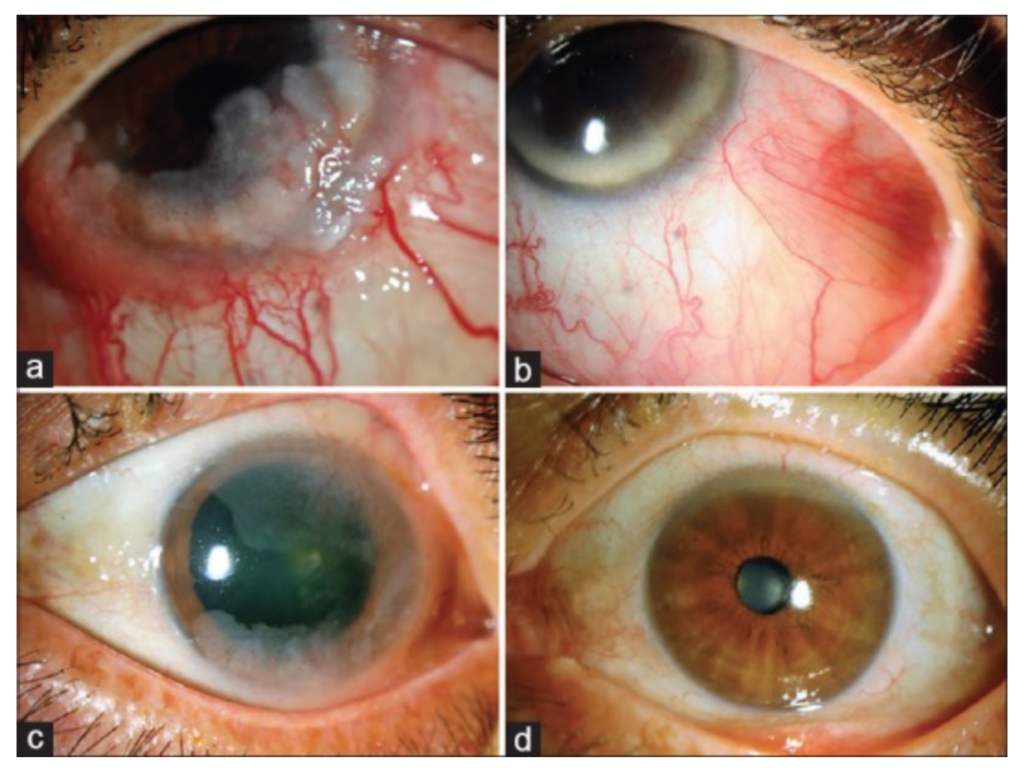 From the summer of 2016 to 2017, Dr. Sonal Chaugule gained a wealth of knowledge as an Eye Cancer Foundation (ECF) fellow under the tutelage of Dr. Paul T. Finger at the NYECC. From shadowing Dr. Finger’s surgeries at the New York Eye and Ear Infirmary, to speaking at the Second Eye Cancer Working Day in March 2017, Dr. Chaugule has since returned to India, using the knowledge she has gained as tools to continue in the footsteps of her mentors. Her efforts manifest in her paper, in collaboration with Dr. J. Park and Dr. Paul Finger, being published by the American Academy of Ophthalmology.
From the summer of 2016 to 2017, Dr. Sonal Chaugule gained a wealth of knowledge as an Eye Cancer Foundation (ECF) fellow under the tutelage of Dr. Paul T. Finger at the NYECC. From shadowing Dr. Finger’s surgeries at the New York Eye and Ear Infirmary, to speaking at the Second Eye Cancer Working Day in March 2017, Dr. Chaugule has since returned to India, using the knowledge she has gained as tools to continue in the footsteps of her mentors. Her efforts manifest in her paper, in collaboration with Dr. J. Park and Dr. Paul Finger, being published by the American Academy of Ophthalmology.
Featured in the headlines of the AAO Newsletter, the paper was first published by the Indian Journal of Ophthalmology in December 2017, and discusses the effectiveness and safety of topical chemotherapy as sole treatment for giant ocular surface squamous neoplasia (OSSN). Ten patients (3 female, 7 male) with biopsy-confirmed giant OSSN were treated with topical chemotherapy drops (interferon alpha 2b and/or 5 flurouracil 1%). Then, patients were monitored for changes in tumor response, vision, recurrence of disease, metastasis, and treatment complications.
Pictured below are samples from the paper, revealing slit-lamp photographs of patients afflicted with OSSN before treatment (A, C) and after treatment (B, D). Pre-treatment for both patients (A, C) and post-treatment (B, D) reveal complete tumor regression after treatment via topical chemistry therapy drops. You may note that there is no evidence of opacity, or haziness, to the cornea in the after photos.
Results found that there was no evidence of vis ion-limiting complications due to treatment by chemotherapy drops — no thinning of the sclera (the white of the eye), no cloudiness in the cornea, and no stem cell deficiency. Noteworthily, there were no tumor recurrences, and none of these 10 patients required additional treatment for their giant OSSN such as surgical excision or cryotherapy. For all patients in this study, there was tumor regression, concluding to researchers that topical chemotherapy drops were not only safe, but effective as treatment for giant OSSN. To read the published study in full, click here.
ion-limiting complications due to treatment by chemotherapy drops — no thinning of the sclera (the white of the eye), no cloudiness in the cornea, and no stem cell deficiency. Noteworthily, there were no tumor recurrences, and none of these 10 patients required additional treatment for their giant OSSN such as surgical excision or cryotherapy. For all patients in this study, there was tumor regression, concluding to researchers that topical chemotherapy drops were not only safe, but effective as treatment for giant OSSN. To read the published study in full, click here.
The ECF offers fellowships to doctors from unserved and underserved countries, providing specialized training in the treatment of retinoblastoma and other eye cancers. Once they complete their training, ECF fellows commit to return home to create eye cancer treatment programs. Dr. Chaugule has begun oncology services at HV Desai Eye Hospital in Pune, India, a vital center for eye cancer research and patient treatment, serving a wide population of not only Indians, but also those from the neighboring countries of Pakistan, Bangladesh, and Nepal.
Through its 2020 Campaign, The Eye Cancer Foundation plans to multiply this success story across the world. With your help, we can train 20 eye cancer specialists to work in 20 countries by 2020.
Our immediate 2020 Campaign goal is to save the lives of 1,000 children by 2020. But that’s only the beginning. Our ability to train doctors and supply them with the equipment they need to properly diagnose and treat retinoblastoma is only limited by the generosity of our donors.
You can become part of the cure with a one-time or recurring donation to The Eye Cancer Foundation. Click HERE to donate today.
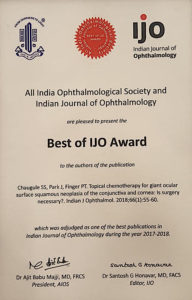 In January of 2018, ECF fellow Dr. Sonal Chaugule, alongside Dr. Paul Finger and Dr. J. Park, published the study “Topical Chemotherapy for Giant Ocular Surface Squamous Neoplasia (OSSN) of the Conjunctiva and Cornea: Is Surgery Really Necessary?” in the Indian Journal of Ophthalmology (IJO). We are pleased to announce that this research has recently been chosen for the Best of IJO Awards!
In January of 2018, ECF fellow Dr. Sonal Chaugule, alongside Dr. Paul Finger and Dr. J. Park, published the study “Topical Chemotherapy for Giant Ocular Surface Squamous Neoplasia (OSSN) of the Conjunctiva and Cornea: Is Surgery Really Necessary?” in the Indian Journal of Ophthalmology (IJO). We are pleased to announce that this research has recently been chosen for the Best of IJO Awards! 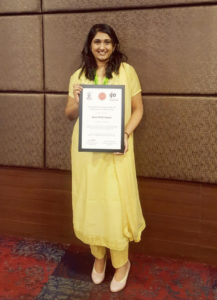 evidence of vision-limiting complications, no tumor recurrences, and no patients required additional treatment for their giant OSSN. For all patients in the study, their cancer was cured, proving to researchers that topical chemotherapy drops were not only safe, but also effective as treatment for “giant” OSSN.
evidence of vision-limiting complications, no tumor recurrences, and no patients required additional treatment for their giant OSSN. For all patients in the study, their cancer was cured, proving to researchers that topical chemotherapy drops were not only safe, but also effective as treatment for “giant” OSSN.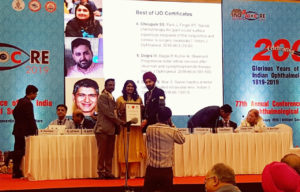



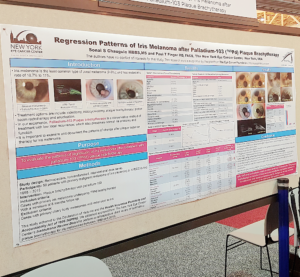
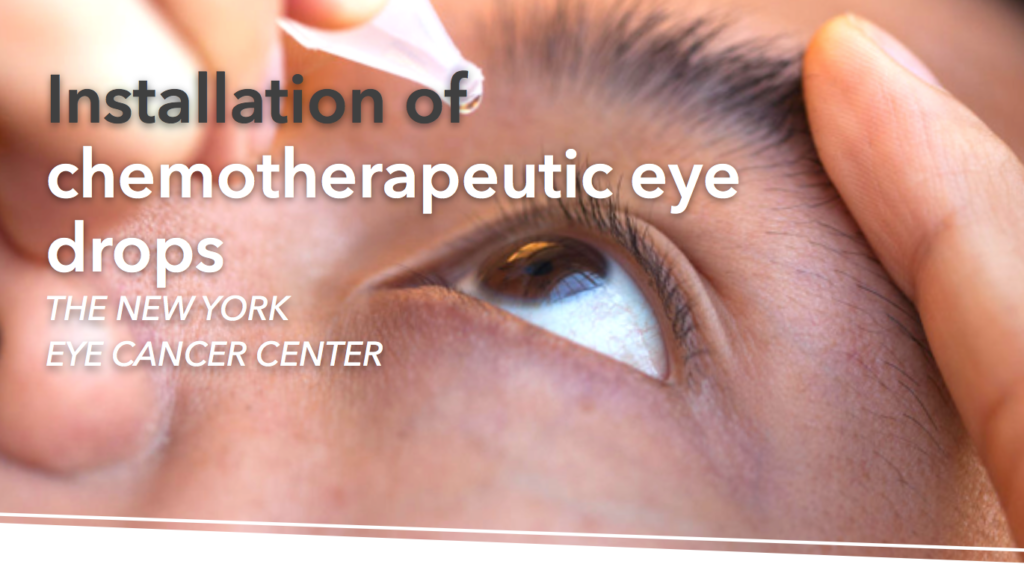
 From the summer of 2016 to 2017, Dr. Sonal Chaugule gained a wealth of knowledge as an Eye Cancer Foundation (ECF) fellow under the tutelage of Dr. Paul T. Finger at the NYECC. From shadowing Dr. Finger’s surgeries at the New York Eye and Ear Infirmary, to speaking at the Second Eye Cancer Working Day in March 2017, Dr. Chaugule has since returned to India, using the knowledge she has gained as tools to continue in the footsteps of her mentors. Her efforts manifest in
From the summer of 2016 to 2017, Dr. Sonal Chaugule gained a wealth of knowledge as an Eye Cancer Foundation (ECF) fellow under the tutelage of Dr. Paul T. Finger at the NYECC. From shadowing Dr. Finger’s surgeries at the New York Eye and Ear Infirmary, to speaking at the Second Eye Cancer Working Day in March 2017, Dr. Chaugule has since returned to India, using the knowledge she has gained as tools to continue in the footsteps of her mentors. Her efforts manifest in 